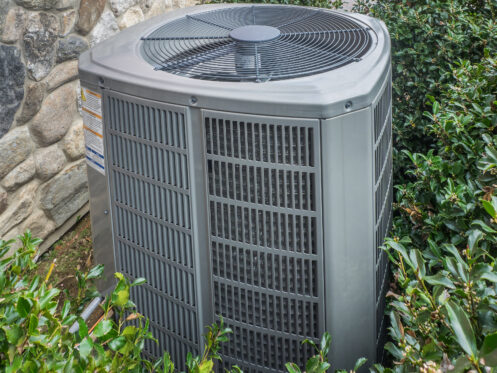When it comes to home heating and cooling, heat pumps are a reliable option. They are efficient, versatile, and eco-friendly. As a result, they are a popular choice for cooling and heating homes. However, like any mechanical system, heat pumps have a limited lifespan. Depending on their age, you can determine when it may be time to repair or replace them. Here is everything you want to know about heat pumps and their lifespans.
What Is the Lifecycle of a Heat Pump?
In the past, the average life expectancy of heat pumps was about 15 years. However, thanks to several technological developments, modern units last around 20-25 years before needing replacement. This estimate can vary based on usage, maintenance, and equipment quality factors.
In the first few years of operation, a heat pump works at its peak efficiency. During this time, the heat pump will require minimal repairs as long as you keep up with your maintenance tasks, such as replacing dirty filters.
In addition, regular maintenance by a professional can help prolong the pump’s life, helping make sure it operates efficiently for as long as possible. If any issues arise during this stage, they will often be minor. At most, you will need to replace worn-out minor components.
However, there are times when you could end up with a defective product. This is why buying a unit with a solid warranty is vital. Most heat pumps come with a five-year warranty. In addition, most quality brands extend this coverage to 10 years if you register your product.
As the heat pump ages, it enters a phase where wear and tear become more apparent. The parts may start to show signs of deterioration. During this time, you may need to make a decision whether to repair or replace. Some of the more significant issues include compressor problems, major refrigerant leaks, or electrical component failures.
While these issues can be fixed, you may want to think about the long-term costs versus the benefits of continued repairs. If you are experiencing frequent breakdowns or expensive repairs, it may be better to replace the pump.
If you have an older model, after the 15-year mark, a heat pump is operating on borrowed time. Even with proper maintenance, the risk of a major breakdown starts to increase. At this point, the cost-benefit of the repair becomes a concern.
Instead of repairing the old unit, you might want to consider an investment in a new, more energy-efficient system. A technician can help you evaluate the remaining lifespan of the heat pump and provide recommendations based on your situation. Sometimes, you can still benefit from repairs. However, purchasing a new heat pump may be better if the costs begin to skyrocket.
When Do You Need to Repair?
Often, minor repairs are cost-effective options. If a minor component fails, such as a fan belt, replacing it can often restore the heat pump to full functionality and not result in a major repair bill. Keep in mind that HVAC technicians can identify minor issues during maintenance. These visits are vital because they will address problems during the tune-up that may otherwise result in considerable damage to the system. Some of the most common parts that need to be replaced include:
- Refrigerant lines
- Thermostats
- Capacitors
- Valves
Additionally, if your heat pump is still under warranty, you can take advantage of this coverage for eligible repairs. Manufacturers provide warranties that cover parts and labor for a certain period. Repairing your heat pump is a reasonable option if they are covered.
When to Replace Your Heat Pump
Heat pumps have a limited lifespan. As they age, they become less efficient, and the cost of repairs increases. At some point, it becomes more economical to replace the heat pump than to continue repairing it.
If you must keep calling technicians for repairs and the bills are piling up, you may want to consider investing in a new heat pump. Experts suggest that if an upcoming repair will cost you half what a new unit would, it is probably time for an upgrade.
In addition, as a heat pump ages, its efficiency decreases due to wear and tear. If you notice a considerable increase in energy consumption and your house is no longer reaching the desired temperature, it’s a sign that your heat pump may be past its prime. Purchasing a new unit may make sense because you will recoup some installation costs due to lower utility bills. A new heat pump will also provide better heating and cooling, making your home more comfortable.
Another consideration is that many homeowners have become increasingly concerned about their HVAC system’s impact on the environment. Newer heat pumps often incorporate environmentally friendly refrigerants and energy-saving technologies such as variable speed motors. If you’re concerned about your carbon footprint and energy consumption, upgrading to an eco-friendly system could be the right choice for your home.
Finally, the HVAC industry evolves at a rapid pace. Over the past few years, there have been major innovations that have enhanced the performance and convenience of heat pumps. If your heat pump is more than a decade old, it probably does not have any of the features and capabilities of newer models, such as integration with smart technologies.
How a Professional Technician Can Help
If you still cannot decide whether to repair or replace your heat pump, a technician can help. These individuals possess the knowledge and experience necessary to assess the condition of your heat pump. They can thoroughly evaluate your system, identifying issues that may not be immediately apparent to the untrained eye. With their help, you will have a full overview of your system’s health.
Along with assessing your current system, these professionals can provide detailed cost estimates for a replacement unit, including the cost of a new heat pump, installation expenses, and any additional services required. You can make better decisions for your home when you understand all the costs associated with repair or replacement.
When you need to replace the heat pump, a technician is there to help you find the best option. They will look at all the factors that may influence the type of heat pump you need, such as the size and configuration of your home and your family’s heating and cooling needs. In addition, they will be able to let you know if the energy efficiency features incorporated into more expensive units will be worth the extra cost in terms of savings on utility bills. With this information, you can make a decision that better aligns with your needs and budget. No one ever wants to have to repair or replace a HVAC unit in their home. However, if it becomes necessary, reach out to a trusted and reliable technician to help you make an informed decision.
Contact the Pros
At F.F. Hitchcock Plumbing, Heating & Cooling, we are a family-owned company that has been delivering home comfort to the residents of Cheshire, Connecticut since 1870. We install, maintain, and replace heating and cooling systems. In addition, we are plumbing and indoor air quality experts. We would also like to invite you to join our maintenance program. Members get annual HVAC tune-ups to ensure their systems stay in good condition and other perks like discounts on repairs and indoor air quality products. Contact us today to schedule an appointment with one of our skilled technicians.








